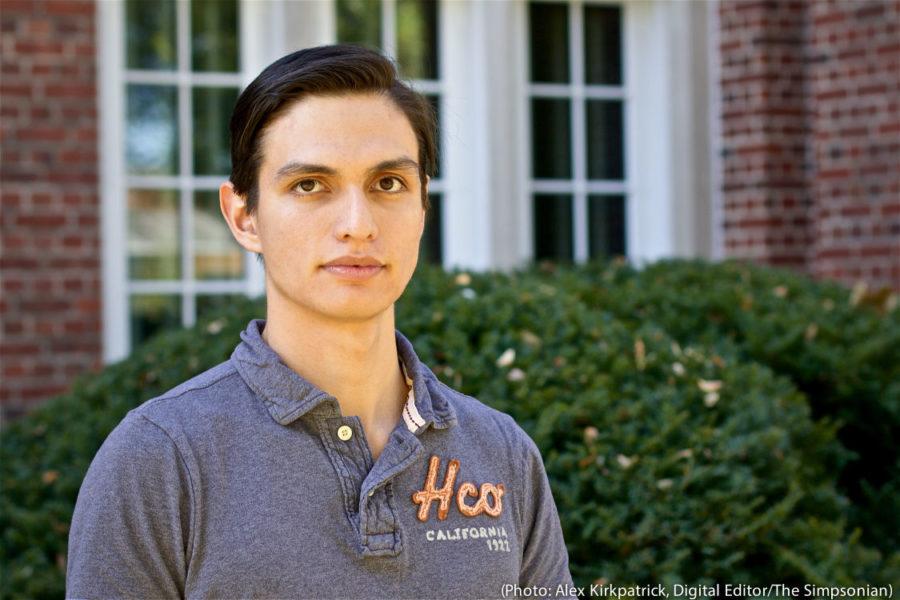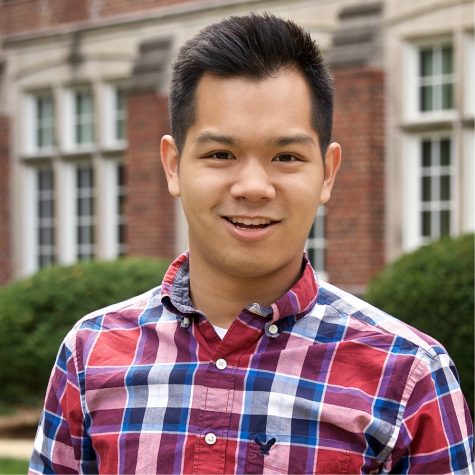Crossing the border: International student talks immigration, racism
November 8, 2015
INDIANOLA, Iowa — Dead bodies litter the streets of Juarez, Mexico — once known as the murder capital of the world — as passersby apathetically move on in their day-to-day lives. Crime and corruption along with sentiments of fear and uncertainty is the norm for citizens.
David De Haro, a 20-year-old accounting major from Juarez, experienced firsthand these graphic scenes unfamiliar to most Iowans, and he is finding a better future after crossing the border to attend Simpson College. The struggle, he said, lies in breaking the racial divide to pursue better opportunities in education and the workforce.
Wearing a ball cap and Hollister T-shirt, De Haro said the American dream, while ideal for most, embodies a larger idea of equal opportunity — a sharp contrast to the traditional Mexican way of life.
“The effort that you put in is what you’ll get out of it. If you work hard, you’ll achieve your goals. In Mexico, that’s not always the case,” De Haro said.
DOORS OPEN IN HIGH SCHOOL
In high school, De Haro’s mother yearned for her son to be bilingual, a skill required to attain competitive jobs in Mexico.
To tackle a foreign language as an adolescent, immersion seemed the only option.
De Haro enrolled in the Lydia Patterson Institute, a Methodist college-preparatory school in El Paso, Texas, where he learned English within one year through intense language training.
Every day at 4 a.m., he made the trek from his home in Juarez, crossed the Rio Grande and stopped at the U.S. Customs and Border Protection to be checked.
Conflicts from other parts of the world impacted procedures in crossing the border.
“You had to wait three hours. After the Boston Marathon bombing, they closed the border completely, so we couldn’t go to school,” De Haro said.
A fellow classmate at Lydia Patterson Institute, Esteban Sierra, heard of a small liberal arts college in Indianola. A Simpson student himself, he persuaded De Haro to take a chance and attend Simpson, reasoning the only other option was to stay in Mexico for a lower-quality education.
After applying for a student visa and the George Washington Carver Scholarship, De Haro received the opportunity to attend Simpson — one step toward the American dream.
ADJUSTING TO AMERICA
De Haro was anxious and afraid of rejection when he came to Simpson.
“I was nervous about being judged. I didn’t want to speak to anyone. You can tell that I’m not from here, and I was expecting racism or something,” he said.
Unbeknownst to De Haro, Simpson students offered open arms — something he’s warmly embraced.
“I made a lot of friends here, and people were so welcoming and nice,” De Haro said.
De Haro also said there’s a better sense of justice, especially in local law enforcement. Coming from a culture where police officers often profit more from bribes than salaries, De Haro said he admires Americans’ trust in their police force.
While acknowledging certain cases of police brutality, such as the shooting of a black teenager in Ferguson, he said he has not felt victimized or targeted because of his race.
“I’m more afraid of being stopped (by a police officer) in my own country than I am here,” he said. “They abuse their power. They’ll charge you for something you haven’t done. They’ll try to take you to jail. Because they have the authority and there’s no media, they get away with it.”
ISSUE AT HAND: IMMIGRATION
De Haro brushed off Republican presidential candidate Donald Trump’s statements about Mexicans when the business mogul claimed:
“When Mexico sends its people, they’re not sending their best. They’re not sending you. They’re not sending you. They’re sending people that have lots of problems, and they’re bringing those problems with us. They’re bringing drugs. They’re bringing crime. They’re rapists. And some, I assume, are good people.”
De Haro said he believes everyone deserves the chance to succeed and pursue their dreams, regardless of their background.
“You cannot generalize that all Mexicans are bad,”De Haro said. “I bet there are probably bad people around — Americans, Mexicans, African-Americans, too.”
As the immigration debate continues to be a primary issue in the upcoming presidential election, The Washington Post reported a lack of evidence exists to suggest immigrants commit more crimes than native-born Americans.
Since the 1990s, immigration and crime levels have had inverse trajectories: Immigration has increased while crime has decreased, according to the Center for Immigration Studies, an institution that advocates for restrictive immigration laws.
After a border surge in 2014, cartel- and gang-related arrests along the Texas southern border decreased, and four out of five arrests for drug smuggling involved U.S. citizens, the Houston Chronicle reported.
The theory remains that immigrants, especially those who are undocumented, have a stronger incentive than native-born Americans to obey the law, fearing risk of deportation.
Data suggest crime rates are interconnected as generations of immigrants assimilate into America; second-generation immigrants are more likely to commit crimes than first-generation immigrants, at levels similar to crime rates as native-born Americans.
INCREASING DIVERSITY
Assistant dean of multicultural and international affairs Walter Lain said the need for diversity grows out of compassion and empathy for different cultures.
“We’re a land of immigrants. It’s always a shock for people that we essentially come from other places. It’s hard to be limited to just one nation, to just one place,” Lain said.
Lain said students like De Haro, who come from underprivileged backgrounds, have a right to pursue the American dream and should do so without fear of persecution.
“We live in a broken and hurt world, and a lot of people are alienated because of the assumptions we make about other cultures,” he said. “We can’t afford to incarcerate large groups of people indefinitely.”
BREAKING THE STIGMA
De Haro and other international students are on visas, meaning they are well-documented.
“The government keeps track of everything they do. They can’t even work off campus. If they leave, they have to let me know. The whole notion of them not paying taxes, that’s totally unfounded. In fact, when they do pay taxes, they don’t even receive the benefits,” Lain said.
Most Americans don’t realize student immigrants are thoroughly regulated, he said.
“Don’t believe the folks who say the international students are coming and taking jobs. The reality is that they have to get permission to do just about anything,” Lain said.
Undocumented immigrants, however, can attend Simpson due to Deferred Action for Childhood Arrivals, a policy allowing undocumented immigrants who follow certain guidelines to request deferred action for a period of two years.
“It’s not an easy process,” Lain said. “By the time they come here, they’ve hopefully completed the documentation.”
In the cases of undocumented students, no financial aid is given and they are not able to leave the country to study abroad.
“I think we have to be bold and take a stand. To me it’s a human rights issue,” Lain said.
DE HARO’S FUTURE
Friends say, De Haro is funny, but above all, loyal. His best friend, Sierra, whom he met at Lydia Patterson Institute, has been with De Haro on both sides of the border.
“I trust De Haro with my life. He is very active and needs to be doing something to stay busy all the time,” Sierr said.
De Haro, a first-generation college student, is uncertain of future endeavors, but he said more opportunities have opened up since coming to America.
“I would like to stay (in America), but if for some reason I can’t, I’ll go back to Mexico and find a job. It’s really impressive for employers to see I studied at an American college,” he said.
Slated to graduate in 2018, De Haro said he’s in no rush to decide on a career. Like many other college students, De Haro desires to travel the world and eventually visit Europe.
By stepping outside his boundaries, De Haro continues to find greater potential within himself, and he hopes everyone — no matter the color of their skin — has the chance to do the same.







